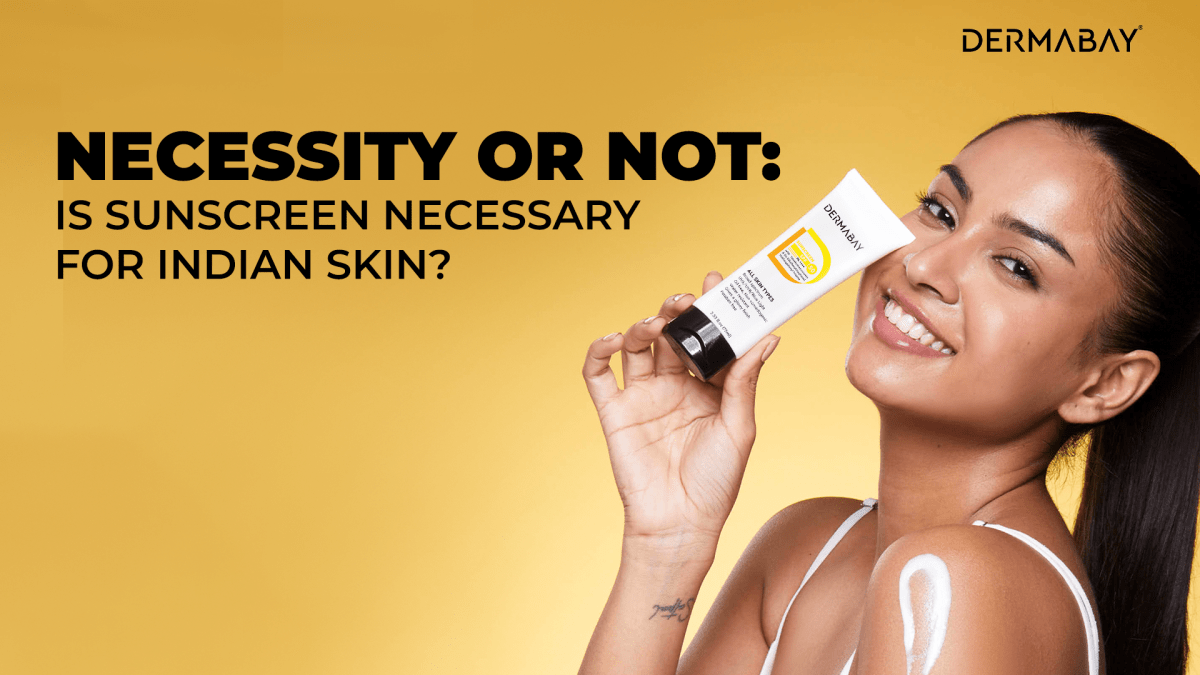India, being a tropical country, receives intense sunlight for most of the year. And yet, a common myth that still lingers is, “Do Indians really need sunscreen?” Some believe melanin-rich Indian skin is naturally protected, while others skip sunscreen altogether thinking it’s only for “fair” skin tones.
So let’s answer the big question once and for all, is sunscreen necessary for Indian skin? The short answer is: Yes. Absolutely. And here’s why.
Understanding Indian Skin and Sun Damage
Indian skin typically falls under skin types IV to VI on the Fitzpatrick scale, meaning it has more melanin. While melanin offers some natural protection against UV rays, it’s not enough to prevent the long-term damage caused by UVB and UVA radiation.
Without proper sun protection, Indian skin is vulnerable to:
-
Hyperpigmentation
-
Premature aging (wrinkles, fine lines)
-
Sunburn and tanning
-
Skin barrier damage
-
Increased risk of skin cancer
So yes, sunscreen for Indian skin is not just beneficial, it's essential.
Why Many Indians Skip Sunscreen, And Why That’s Risky
Many people in India avoid sunscreen because of:
-
Greasy or sticky texture in hot climates
-
Fear of breakouts
-
White cast on deeper skin tones
-
Belief that brown skin doesn’t burn
However, modern sunscreens are now formulated keeping these concerns in mind. New-age products offer lightweight, non-comedogenic, and white-cast-free solutions specifically tailored to Indian skin.
That’s why choosing the right sunscreen for Indian skin makes all the difference.
5 Solid Reasons Sunscreen Is Necessary for Indian Skin
1. Prevents Hyperpigmentation
Indian skin is more prone to pigmentation disorders like melasma and sunspots. Sunscreen helps prevent further darkening and maintains even skin tone.
2. Reduces Premature Aging
UV exposure is the leading cause of early wrinkles, fine lines, and dull skin. A good sunscreen delays signs of aging, regardless of your skin tone.
3. Shields Against Skin Cancer
Though rare in darker skin types, skin cancer can still occur, and it’s often diagnosed late due to low awareness. Daily sunscreen use provides vital protection.
4. Protects Skin Barrier
Consistent sun exposure weakens the skin’s natural barrier, leading to dryness, irritation, and increased sensitivity. Pairing your sunscreen with a Hydrating Moisturizer can further boost skin resilience.
5. Complements Active Skincare
Using products with active ingredients like retinol or niacinamide? They make your skin more sensitive to the sun. Skipping sunscreen = faster pigmentation, irritation, and reduced effectiveness.
When and How to Use Sunscreen for Best Results
Even if you're staying indoors or it's cloudy outside, UVA rays still penetrate through windows and clouds. So sunscreen isn’t just a summer or beach essential, it’s an everyday product.
How to Apply Sunscreen (The Right Way):
-
Use it every morning after applying your Hydrating Moisturizer
-
Apply 2 fingers’ length of sunscreen for the face and neck
-
Reapply every 2–3 hours if you’re outdoors or sweating
-
Don’t skip areas like ears, neck, and under eyes
Who Should Use Sunscreen?
Literally everyone, men, women, teens, even kids above 6 months. And yes, even if you’re using makeup, apply sunscreen as your base layer.
Best Types of Sunscreen for Indian Skin
When choosing a sunscreen for Indian skin, consider your skin type and climate:
For Oily or Acne-Prone Skin:
-
Look for gel-based, matte finish sunscreens
-
Should be non-comedogenic and oil-free
-
Try our lightweight Sunscreen that leaves no white cast
For Dry Skin:
-
Choose cream-based sunscreens with moisturizing agents
-
Look for SPF 30 or above along with hydration support
-
Pair with a Hydrating Moisturizer for best results
For Sensitive Skin:
-
Opt for mineral or physical sunscreens
-
Avoid fragrance and alcohol
-
Our dermatologist-approved Sunscreen is gentle and safe for daily use
SPF: What Number Do You Really Need in India?
In Indian weather, you should opt for:
-
Minimum SPF 30 for daily use
-
SPF 50+ if you’re stepping out for longer hours or exposed to direct sun
Also, look for the PA rating (e.g., PA+++, PA++++). It tells you how well the product protects against UVA rays (the aging rays). The more “+”, the better.
Common Myths About Sunscreen – Busted
“I’m indoors most of the time, I don’t need sunscreen.”
UV rays still penetrate glass windows. You need protection even inside.
“Sunscreen causes acne.”
Only if you’re using the wrong one. Choose non-comedogenic sunscreens for acne-prone skin.
“I’m dark-skinned, so I won’t burn.”
Melanin helps but doesn’t block UV rays entirely. You’re still at risk of sun damage.
Final Verdict: Is Sunscreen Necessary for Indian Skin?
Absolutely, yes.
Indian skin needs protection not just from tanning but from pigmentation, aging, and long-term damage. Whether you're fair or dusky, dry or oily, young or mature, sunscreen is your skin’s daily shield.
Looking for a lightweight, white-cast-free sunscreen made for Indian skin? Try our best-selling Sunscreen
Don’t forget to lock in hydration with our Hydrating Moisturizer
Protect now, glow forever.


